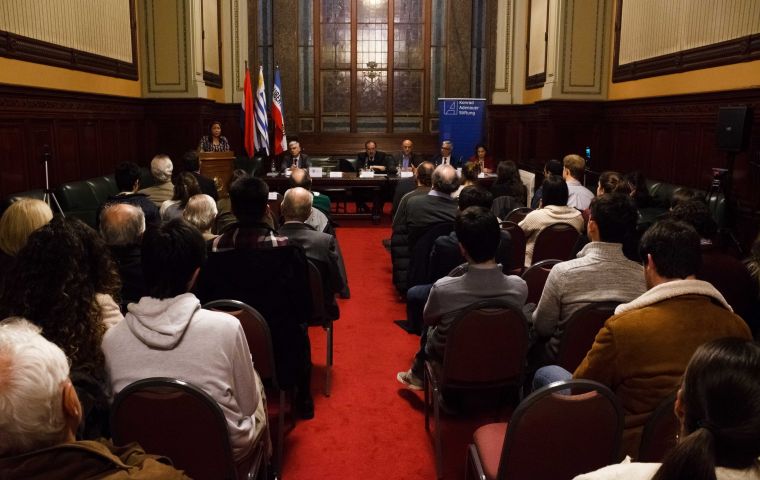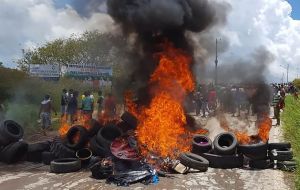MercoPress. South Atlantic News Agency
The democratic challenge to dictatorships and xenophobia in Latin America
 The panel discussed the democratic clauses of the different institutional bodies in the continent against the erosion of the rule of law
The panel discussed the democratic clauses of the different institutional bodies in the continent against the erosion of the rule of law  The Parlasur approved on Monday, unanimously, the sending of an official mission to the Venezuelan border with Colombia and Brazil, in order to relieve the migratory situation in the region.
The Parlasur approved on Monday, unanimously, the sending of an official mission to the Venezuelan border with Colombia and Brazil, in order to relieve the migratory situation in the region.  For William Dávila, it is necessary to be forceful against the Maduro government, which “cares little” that migrants cause problems of instability in the countries of the region.
For William Dávila, it is necessary to be forceful against the Maduro government, which “cares little” that migrants cause problems of instability in the countries of the region.  The Uruguayan Senator Pablo Mieres points out that the Venezuelan people “flee from the terror of totalitarianism”
The Uruguayan Senator Pablo Mieres points out that the Venezuelan people “flee from the terror of totalitarianism” During the conference entitled “The democratic challenge to the autocracies of the 21st century in Latin America,” organized by the Center for the Opening and Development of Latin America (CADAL) on Tuesday at the Senate of Uruguay, the Government of Venezuela was described as a “dictatorship” and it was exhorted that the democratic governments of the region, especially the Uruguayan government, not be indifferent or “accomplices” against today’s Latin America’s autocratic governments.
The panel, made up of Uruguayan and Venezuelan parliamentarians and regional authorities, debated the democratic clauses of the different institutional organisms in the continent in the face of the erosion of the rule of law and the autocratic governments of Latin America at present. Special emphasis was placed on the cases of Venezuela, Nicaragua and Cuba.
“Venezuela is a country that is beginning to be closed from outside; the region begins to close the doors,” says Jorge Gandini, president of the lower house of the Congress of Uruguay during the conference in reference to the new migration rules adopted by the governments of Peru and Ecuador and the tensions with the northern border state of Roraima, in Brazil.
Gandini explains that, unlike the Government of Cuba, which “closed its doors from within” decades ago, Venezuela is beginning to isolate itself in the region as there is the possibility that millions of people, seeking to flee from the deep economic crisis, will cause problems to the fragile socioeconomic stability in nearby countries.
According to the United Nations Organization for Migration (IOM), around 2.3 million Venezuelans have emigrated due to the economic crisis the country is experiencing.
At least a million of them have passed through Colombian territory since the beginning of 2017, of which more than half million have traveled by land to Ecuador, Peru, Chile and Argentina after extensive bus trips or even on foot.
Peru has become one of the main destinations for this migratory movement due to the migratory facilities that have occurred with the last governments. According to the United Nations Agency for Refugees (UNHCR) only in 2018 the Peruvian government has already received 90,000 asylum applications from Venezuelans.
However, in recent months there have been outbreaks of xenophobia among some sectors of societies in certain recipient countries.
During the conference both Gandini and Uruguayan deputy Rodrigo Goñi, both from the National Party (Uruguay), expressed their concern regarding the position of the Uruguayan Government against that of Venezuelan President Nicolás Maduro.
“Unfortunately, we have a government that has been indifferent” against Venezuela, Nicaragua and Cuba, Goñi said, pointing out that the Uruguayan government has become equally an “accomplice” of governments that are responsible for deaths and violations of Human Rights.
The government of Uruguayan President Tabaré Vázquez has been characterized by not defining a strong position in the face of the democratic crises that Venezuela and Nicaragua are going through. The Uruguayan chancellery has repeatedly expressed that it opposes any “illegal act of violence with political ends” in Venezuela. However, the chancellery has not spoken out about the investigation of the International Criminal Court (ICC), which is investigating the use of “excessive force” by the State security forces and the use of “violent means” to repress the protesters, according to the announcement of the ICC prosecutor, Fatou Bensouda in February.
The political position that Uruguay has taken in the face of the political crisis in Nicaragua, which has left between 317 and 448 people killed since April according to humanitarian organizations, is somewhat different from the one it has taken against the former President Hugo Chávez’s country. The Uruguayan government has adhered to the positions of the countries of the region that condemn the government of Daniel Ortega, urging his government to stop the attacks against the demonstrators.
However, regarding the migratory aspect, Uruguay has been characterized as a friendly recipient of the Venezuelan migratory flow, despite the fact that the number of Venezuelan residents on Uruguayan soil did not exceed 13,000 at the beginning of 2018. On July 26, The International Labor Organization (ILO) stressed that the Uruguayan legislation on immigration is a model to replicate in other countries.
Diego Cabrita, representative of the civil society of help to the immigrant in Uruguay Veneguayos, indicates that the number of cases of Venezuelans with problems of paperwork has diminished since the migratory norms have become more flexible.
For PARLASUR parliamentarian for Venezuela, William Dávila, it is necessary to be forceful against Maduro's government, which “cares little” that migrants cause problems of instability in the countries of the region. However, it is unconstitutional to limit the circulating right in the region to Venezuelans, demanding documents that are difficult to access in Venezuela such as the passport.
Dávila indicates that the PARLASUR should urge the governments of the region to respect the treaties that gave rise to Mercosur, respecting the fact that the “Identity Card is a legal document to move from one country to another” in the continent.
However, the migration issue thanks to the Venezuelan exodus has not stopped becoming a political, boiling issue in the region.
After the riots in which locals burned the belongings of 1,200 Venezuelans in the border town of Pacaraima, between Venezuela and Brazil; and where 25% of the inhabitants are Venezuelans and live in tents between bus stations and abandoned houses in the area, Brazilian politicians from the state of Roraima have once again called for the closure of the federal government's borders with the support of communities driven by a wave migration that has oversaturated the health system and the services of a state with little infrastructure. Turning, for the first time in history, Venezuelan migrants into political material which can be attacked with the support of the nascent xenophobia in the region.




Top Comments
Disclaimer & comment rules-

-

-

Read all commentsThe Organisation of American States has clearly failed to live up to its own charter and principles in respect of the Falkland Islands. Meanwhile Argentine colonization and expansionism has been thoroughly endorsed.
Aug 23rd, 2018 - 12:40 pm 0Falklands & The OAS (1 PG): https://www.academia.edu/37213227/Falklands_and_The_OAS
Hear, hear!
Aug 23rd, 2018 - 04:08 pm 0The Dictatorships, Democracies & Communism failed miserably in Latin America. What's NEXT?
Aug 27th, 2018 - 01:30 pm 0Commenting for this story is now closed.
If you have a Facebook account, become a fan and comment on our Facebook Page!